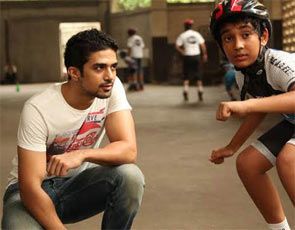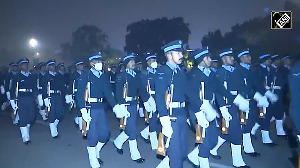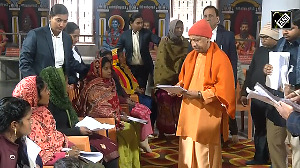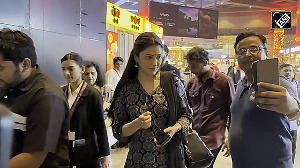 Hawaa Hawaai is an earnest, important and evocative film, says Raja Sen.
Hawaa Hawaai is an earnest, important and evocative film, says Raja Sen.
It is a rare and wondrous thing when students genuinely admire a teacher.
I remember sniggering cruelly many years ago when my kid brother, extolling the virtues of one of those self-aggrandising heads of tuition institutes, resolutely referred to him as "Sir Vipin" instead of "Vipin Sir," convinced of his greatness and boardexam-beating power.
Growing up, we're naturally disposed unfavourably toward teachers, but the few who shine through and make us believe also win us over completely.
Merely being their student becomes a point of young pride, and we begin thus to look to them for perfection, unreasonably expecting flawlessness and answers to everything.
It's stunning, faith.
And this is the wide-eyed keenness Amole Gupte captures so well in Hawa Hawaai, where a skating-instructor is merrily deified by his adoring children, hoisted by them onto a rockstar-high pedestal.
"Lucky Sir, Lucky Sir," they chime in unison (younger but wiser than my knighthood-conferring sibling, clearly) as their sharp-eyed teacher shows up to an empty parking lot -- and encourages them to fly.
Lucky Sir happens to be sitting in a wheelchair while cheering the kids on, but this doesn't stop eager tea-boy Arjun from instinctively recognising a superhero. He sees the swish kids swoosh around on their rollerblades and dreams of wheels on his own feet, and the film is about following those dreams, come what may.
It's a smart angle for the film, too.
Rollerblades, by their very nature -- that of something normal stuck onto something normal to make something relatively extraordinary -- lend themselves perfectly to the Do-It-Yourself concept, and armed with an ensemble of talented (and adorable) youngsters, Gupte affectionately crafts a truly sweet underdog story.
Modelled on those American movies where fathers and sons build flimsy soapbox-racers that go on to beat karts many times as expensive, Hawa Hawaii is simple but wonderful.
It's a well-textured and etched film, one refreshingly lacking in villains -- even the richest, chubbiest kid isn't a meanie -- and one that heartbreakingly but smilingly illustrates the disparity between the kids shown in the film and the kids who can afford to buy theatre tickets to watch this film.
Which is exactly why you should drag every kid you care about to this movie.
It is also the kind of film that may well have been dismissed as cloying, predictable or manipulative, but so stridently does Gupte's sincerity shine through that cynicism is left at the door very early on.
The film opens with a father singing an ode to the daily bread while a mother makes chapatis, and this, naturally, is a massive gamble, a move that could make the film seem dated, stagey and too much of a morality tale, but Gupte (who literally sings this song) endows this basic moment with such heart and warmth that it serves only to make the audience feel cosier about the idea of a moral lesson.
Played by Gupte's son Partho, Arjun is an indefatigable youngster, a well-raised boy who wears a constant smile to fend off hard times.
Partho is a fine actor and an irresistibly cute kid -- with superb Hindi elocution -- and Gupte surrounds him with a quartet of kids who are every bit his equal.
These four -- Gochi (Ashfaque Khan), Bhura (Salman Khan), Abdul (Maaman Menon) and Murugan (Tirupati Krishnapelli) -- play homeless kids working several rungs below minimum wage, and they make for an amazing entourage, the real wheels pushing Arjun ahead. It's hard not to smile (and sob) at them.
Saqib Saleem, one of those naturally talented actors lacking in false notes, plays Lucky, and he's a great fit for Gupte's cinema considering how his performances hinge on believability instead of bluster.
His is a more demanding character than initially apparent, and Saleem handles it well.
He takes one look at Arjun's homemade skates and incredulously dubs him his Eklavya, his 'unworthy' student and true champion, and thus do the kids begin calling him "Eklaava."
Most of the cast is on the money: Makarand Deshpande is beatific and blissed out as Arjun's father, Neha Joshi is terrific as the boy's mother, and it's always good to see Razzak Khan grin. But the kids are the champs.
This is a brisk, enjoyable film, and while the climactic race is somewhat marred by an overdose of melodrama -- Gupte's far better at subtler strokes than the few broad ones he tries -- it is rare to find a Hindi film hero more deserving of our cheers than Arjun.
That unfortunate hint of Bhaag Milkha Bhaag in the final race doesn't alter the fact that this is an earnest, important and evocative film.
Important? Yes.
Gupte's first film, the marvellous Stanley Ka Dabba was better-realised cinematically and held more to cherish, but Hawa Hawaai tries to bite off more.
And while its larger point about farmer suicides certainly ought have been handled more subtly, at least this film -- like its characters -- goes for broke.
And that's what makes it special. Or as Arjun would say, "peshal."
Rediff Rating: 











 © 2025 Rediff.com -
© 2025 Rediff.com -